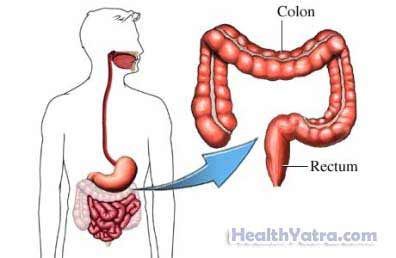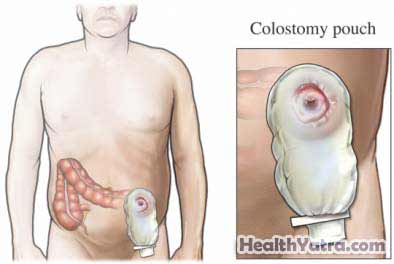Colectomy Laparoscopic Surgery Definition
This is a procedure to remove all or part of the colon. The colon, or large intestine, is the lower part of the intestines. In a partial colectomy, only part of the colon is removed. In a total colectomy, all of the colon is removed.

পদ্ধতির কারণ
A colectomy may be done to treat a variety of conditions, including:
- Colon cancer
- Inflammatory intestinal diseases (eg, colitis, Crohn’s disease)
- Intestinal blockage
- Trauma to the intestine
- Diverticular disease —small pouches form in the wall of the colon
- Precancerous polyps (eg, familial polyposis)
- A hole in the bowel wall or dead piece of bowel
- Bleeding from the colon
সম্ভাব্য জটিলতা
If you are planning to have a colectomy, your doctor will review a list of possible complications, which may include:
- Damage to other organs or structures
- সংক্রমণ
- রক্তপাত
- Hernia forming at the incision site
- রক্ত জমাট
- Complications from general anesthesia
জটিলতার ঝুঁকি বাড়াতে পারে এমন কারণগুলির মধ্যে রয়েছে:
- Neurological, heart, or lung conditions
- Age: older than 70 years
- স্থূলতা
- ধূমপান
- Previous abdominal surgery
- সংক্রমণ
কি আশা করছ
পদ্ধতির আগে
আপনার ডাক্তার নিম্নলিখিত করতে পারেন:
- শারীরিক পরীক্ষা
- রক্ত পরীক্ষা
- Ultrasound exam of the abdomen—a test that uses sound waves to visualize the inside of the abdomen
- Barium X-ray —x-ray exam of the abdomen after swallowing a barium drink and/or receiving a barium enema
- CT Scan —a type of x-ray that uses a computer to make pictures of the inside of the body
- MRI Scan —a test that uses magnetic waves to make pictures of the inside of the body
- Colonoscopy and biopsy —exam and removal of tissue inside the large intestine using a flexible tube with a camera on the end
আপনার পদ্ধতি পর্যন্ত নেতৃত্ব:
- Talk to your doctor about your current medicines. Certain medicines may need to be stopped before the procedure, such as:
- Aspirin or other anti-inflammatory drugs for up to one week before surgery
- Blood-thinning drugs (eg, warfarin [Coumadin])
- ক্লোপিডোগ্রেল (প্লাভিক্স)
- Drink at least eight, 8-ounce glasses of water daily.
- If recommended by your doctor:
- একটি বিশেষ খাদ্য অনুসরণ করুন।
- জোলাপ গ্রহণ করুন।
- Take antibiotics.
- Shower the night before the procedure using antibacterial soap.
- Arrange to have someone drive you home and to help you at home.
- The night before, eat a light meal or drink clear liquids. Do not eat or drink anything after midnight unless told otherwise by your doctor.
এনেস্থেশিয়া
You will receive general anesthesia. You will be asleep.
পদ্ধতির বর্ণনা
The doctor will make small incisions in the abdomen. She will then insert instruments through these incisions . The section of colon will then be removed through these small openings. The doctor may then sew together the two parts of the colon. In some cases, the doctor may need to switch to open surgery. This involves making a larger incision.
If all of your colon is removed, a colostomy or ileostomy will be done. This will create a path for waste to leave the body. The doctor will make a small opening, called a stoma, in the front of the abdominal wall. The open end of your intestine will be attached at the stoma. The stoma may be either temporary or permanent. This procedure may also be done if your intestine needs time to heal.

Stitches or staples will be used to close the area. A bandage will be placed over the incisions.
অবিলম্বে প্রক্রিয়া পরে
You will be taken to the recovery room.
How Long Will It Take
1- 4 hours or more
এটা কতটা আঘাত করবে?
You will have pain after the surgery. Your doctor will give you pain medicine.
গড় হাসপাতালে থাকার
The hospital stay is 5-6 days. You may need to stay longer if you have complications.
পোস্ট-প্রক্রিয়া যত্ন
হাসপাতালে
The hospital staff will:
- Give you instructions about diet and activity if you have a stoma and a bag to collect waste. During the first few days after surgery, you may be restricted from eating.
- Instruct you to wear boots or special socks to prevent blood clots in your legs.
- Encourage you to do deep breathing to help prevent pneumonia.
ঘরে
If you have a colostomy:
- Limit activity for 1-2 months.
- A nurse will teach you how to care for the stoma site and change the ostomy bag.
- Slowly progress from a clear liquid diet, to a bland, low-fiber diet. You will slowly advance to a regular diet.
- Tell your doctor and pharmacist that you cannot take medicines that are time-released or time-sustained.
- Do not take laxatives.
- Drink eight, 8-ounce glasses of fluid every day. Extra fluid will be lost in your stool.
- কখন গোসল করা, গোসল করা বা জলে ভিজানো নিরাপদ সে সম্পর্কে আপনার ডাক্তারকে জিজ্ঞাসা করুন।
- আপনার ডাক্তারের নির্দেশাবলী অনুসরণ করুন.
আপনার ডাক্তারকে কল করুন
আপনি হাসপাতাল ছেড়ে যাওয়ার পরে, নিম্নলিখিতগুলির মধ্যে যেকোনটি ঘটলে আপনার ডাক্তারের সাথে যোগাযোগ করুন:
- জ্বর এবং ঠাণ্ডা সহ সংক্রমণের লক্ষণ
- লালভাব, ফোলাভাব, ক্রমবর্ধমান ব্যথা, অত্যধিক রক্তপাত, বা ছেদ স্থান থেকে কোনো স্রাব
- Nausea and/or vomiting that you cannot control with the medicines you were given, or that lasts for more than two days
- ব্যথা যা আপনি ওষুধ দিয়ে নিয়ন্ত্রণ করতে পারবেন না
- ব্যথা, জ্বালা, জরুরী বা প্রস্রাবের ফ্রিকোয়েন্সি, বা প্রস্রাবে অবিরাম রক্তপাত
- কাশি, শ্বাসকষ্ট বা বুকে ব্যথা
- জয়েন্টে ব্যথা, ক্লান্তি, শক্ত হওয়া, ফুসকুড়ি বা অন্যান্য নতুন উপসর্গ
- Feeling weak or dizzy
- আপনার পা, বাছুর বা পায়ে ব্যথা বা ফোলা
- Bloody or black stools
- ডায়রিয়া
- Lack of stool in the colostomy bag
- সাংঘাতিক পেটে ব্যথা
- Bleeding from the stoma
- Not collecting stool in the ostomy pouch
জরুরী পরিস্থিতিতে, অবিলম্বে চিকিৎসা সহায়তার জন্য কল করুন।
